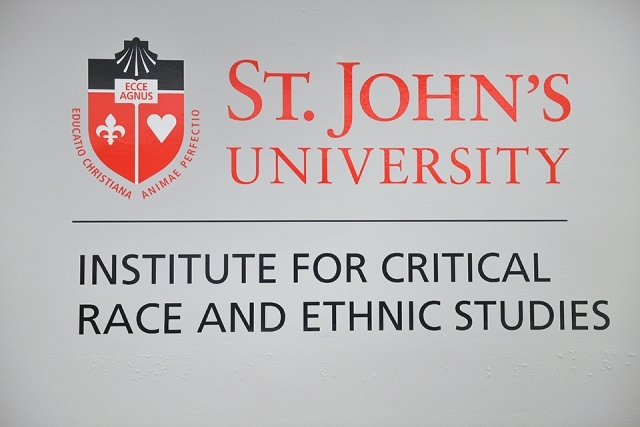
With roots in Brooklyn, NY—and a founding and enduring mission to serve immigrant families and their children—St. John’s University is the beneficiary of a generous foundation that has pledged to do the same.
The Sansone Foundation, named in memory of Mary C. Sansone and her husband Zachary—who had a shared passion for righting wrongs—will provide a total of $300,000 to support the Institute for Critical Race and Ethnic Studies (CRES) and students, faculty, administrators, or staff at St. John’s University who engage in St. John’s community or external community social justice-related research and programs.
“The CRES Institute is a newly formed research unit at the University whose work is centered around developing solutions to systemic racism and the problems it creates when it intersects with other areas of life such as gender, sexuality, class, and ability,” stated Natalie P. Byfield, Ph.D., CRES Director and Professor, Department of Sociology and Anthropology, St. John’s College of Liberal Arts and Sciences. “Like the Sansones, our learning goals and constituencies reflect the city that we proudly serve.”
Mary, a child of Italian immigrants, was a gutsy Brooklyn social worker who created a robust community service organization that bridged racial and ethnic barriers. She died in 2018 at the age of 101; her obituary in the New York Times described her as “a local folk hero and political godmother” to decades of public officials from all sides of the political spectrum.
From a single-family row house in Borough Park that became a required stop for candidates and public servants, the Sansones dispensed grass-roots wisdom and raised awareness of the plight of the marginalized in New York City. In their well-lived lives, Mary and Zachary were bipartisan change agents who for more than 70 years worked with local, state, and federal elected officials to build bridges in New York City communities and beyond.
Born before women secured the right to vote, Mary began her lifelong commitment to social activism as an eight-year-old, watching her father in Union Square as he addressed potential recruits to the Industrial Workers of the World, a prominent union at the time. In 1949, Mary married Zachary Sansone, a Brooklyn-born lawyer who had grown up in Naples, Italy, and returned to America when he was 32 to work as a shop steward for the longshoremen’s union.
In 1964, the couple founded the Congress of Italian Americans Organization, a social services group known by the acronym CIAO, whose early meetings were held in their basement. CIAO grew into a multimillion-dollar organization that provided job training, daycare, after-school programs, scholarships, and other services originally focused on poor and uneducated Italian Americans that later expanded.
In 1988, she founded a group called CURE (Community Understanding for Racial and Ethnic Equality)—and those were just some of the social justice issues to which they devoted their lives. Mr. Sansone died in 2010 at the age of 93.
After meeting with civil rights leader Bayard Rustin in 1971, Mary, along with the New York Urban Coalition, launched an ambitious effort to unite the city’s Black, Hispanic, and White ethnic communities in a common agenda.
“With gratitude and the responsibility to honor the historic legacy of Mary and Zachary Sansone, St. John’s is proud to do the work necessary to elevate and serve those most in need,” said Christian P. Vaupel, Ed.D., Vice President for Advancement and University Relations.
The Mary C. Sansone Fellowship Endowment Fund will provide a total of $150,000 in support to CRES and its work with students, faculty, administrators, or staff at St. John’s who engage in St. John’s community or external community social justice-related research and programs.
The Zachary Sansone Fellowship Endowment Fund will provide a total of $150,000 in support to CRES to research and provide programs and studies that promote solutions to problems created by systemic racism, oppression, or social justice-related programming.
Related News
Q&A with Christopher E. Fisher, Psy.D. ’14M.S.Ed., LEAD Honoree
Christopher E. Fisher, Psy.D. ’14M.S.Ed., Licensed Clinical Psychologist and Director, Behavioral Health in Zucker Hillside Hospital, will be among several alumni honored by The School of Education...
Q&A with Alicia Calabrese ’94SJC., LEAD Honoree
Alicia Calabrese ’94SJC, Principal of Floral Park Memorial High School, will be among several alumni honored by The School of Education (TSOE) at the 15th Annual Leaders in Education Awards Dinner...
Q&A with Brenda Almendarez-De Bello ’06M.S.Ed., ’19Ed.D., LEAD Honoree
Brenda Almendarez-De Bello ’06M.S.Ed., ’19Ed.D., Principal of Tamarac Elementary School in the Sachem Central School District , will be among several alumni honored by The School of Education (SOE) at...
